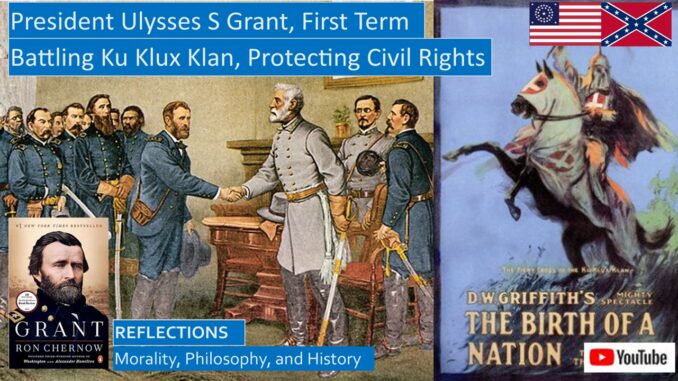
Why was President Grant so popular? Why did the scandals that engulfed his administration never involve him personally?
Was Grant guilty of nepotism and cronyism?
Why didn’t Grant face any challengers for the nomination for the Presidency?
How was President Grant able to suppress and abolish the first iteration of the Ku Klux Klan?
Why was the Department of Justice created during Grant’s first term as President?
PRIOR REFLECTIONS ON CIVIL WAR AND GENERAL GRANT
The root causes of the Civil War date back to the 1830s, when the abolitionist movement to abolish slavery began, and when President Andrew Jackson threatened the use of federal troops to prevent the secession of South Carolina in a tariff dispute.
Soon after his victory at Vicksburg, Mississippi, giving the Union complete control over the Mississippi River basin, General Ulysses S Grant was named overall commander of the Union forces. His nickname was Unconditional Surrender Grant.
How Did the Speeches of Daniel Webster Inspire the North to Fight To Preserve the Union?
https://seekingvirtueandwisdom.com/how-did-the-speeches-of-daniel-webster-inspire-the-north-to-fight-to-preserve-the-union/
https://youtu.be/etLbkY_zgY0
Civil War Struggle Through Paintings
http://www.seekingvirtueandwisdom.com/civil-war-struggle-through-paintings/
https://youtu.be/2hoBOSOBUP8
Stories of How Slaves Helped the Union Win the Civil War: Yale Lecture Notes
http://www.seekingvirtueandwisdom.com/stories-of-how-slaves-helped-the-union-win-the-civil-war-yale-lecture-notes/
https://youtu.be/89ulb20cy8Q
Siege of Vicksburg: Ordinary Union Soldiers and Generals Grant and Sherman Recount the Struggle
https://seekingvirtueandwisdom.com/siege-of-vicksburg-ordinary-union-soldiers-and-generals-grant-and-sherman-recount-the-struggle/
https://youtu.be/U6KNO6IkVQs
On July 4, 1863, on the same day as the victory at Vicksburg, General Meade won a Union victory at the Battle of Gettysburg. At the final major battle of the Civil War at Appomattox, General Grant accepted the surrender of Robert E Lee’s army. He generously allowed the rebels to keep their horses to help with spring planting, and simply paroled the soldiers after they surrendered their weapons, allowing them to ride home on the Union railroads free of charge. This mercy did help ease the resentments of the ex-Confederate soldiers, at least for a time.
Immediately after the end of the Civil War, Grant dispatched Union troops to the border of Mexico, causing France to withdraw its troops from there, which led to the overthrow of Emperor Maximillian. Spain also ended its involvement in the affairs of Santo Domingo, today’s Dominican Republic. Grant was in favor of admitting Santo Domingo into the Union as a new state.
As the leading Union general, Grant played a key role in Presidential Reconstruction and keeping order in the former Confederate states. When he won the Presidency, Grant continued his role in promoting Reconstruction and protecting the civil rights of black citizens, protecting them from the white supremacists of the newly formed Ku Klux Klan. These KKK night riders terrorized and murdered blacks, often stealing or burning their property, intimidating them to keep them from voting.
Gettysburg: Ordinary Soldiers and Generals Pickett and Longstreet Remember the Bloody Charges
https://seekingvirtueandwisdom.com/gettysburg-ordinary-soldiers-and-generals-pickett-and-longstreet-remember-the-bloody-charges/
https://youtu.be/ibTm3l-C8VQ
Robert E Lee Surrendering to Grant at Appomattox, Ending the American Civil War
https://seekingvirtueandwisdom.com/surrender-at-appomattox-courthouse-ending-the-american-civil-war/
https://youtu.be/_Dr7qia6XkQ
General Grant’s Memoirs, Civil War Diplomacy, Post-War Events in Mexico and Santo Domingo
https://seekingvirtueandwisdom.com/general-grants-memoirs-civil-war-diplomacy-post-war-events-in-mexico-and-santo-domingo/
https://youtu.be/14xYWgYmb10
General Grant Supporting Civil Rights and Reconstruction After the Civil War, and His Conflicts with Andrew Johnson
https://seekingvirtueandwisdom.com/general-grant-supporting-civil-rights-and-reconstruction-after-the-civil-war-and-his-conflicts-with-andrew-johnson/
https://youtu.be/9OJnW4hAizI
GRANT NOMINATED AND HANDILY ELECTED AS PRESIDENT
As President Johnson’s popularity declined, General Grant’s popularity increased. Days after President Johnson was acquitted of his impeachment charges, the Republicans nominated Grant as their presidential candidate on the first ballot, as he was the only nominee. During that era, the Presidential candidates refrained from campaigning and making speeches. House Speaker Schuyler Colfax of Indiana was nominated to run as Vice-President.
Andrew Johnson ran second on the first two ballots in the Democratic Convention, but his candidacy quickly faded after that. Horatio Seymour, a notorious Copperhead governor, was nominated, denouncing the Emancipation Proclamation, promising to halt Reconstruction and allow white governments in the former Confederate states.
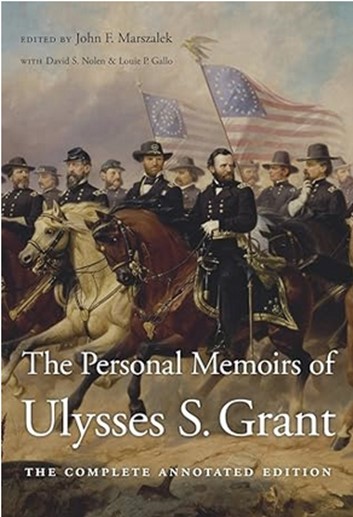

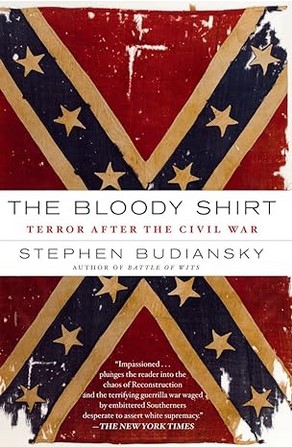
Our biographer Ron Chernow writes: “The campaign’s most chilling feature was the huge wave of murder and arson orchestrated by the Ku Klux Klan against black and white Republicans in the South. As state conventions” in the former Confederate states “drafted new state constitutions that endowed blacks with the franchise, the white South acted to stamp out that voting power through brute force. Nathan Bedford Forrest,” head of the KKK, “boasted that the Klan had recruited four thousand men in Tennessee alone, half a million across the South.”
Why was there such a blood-thirsty backlash? “In South Carolina and Mississippi, blacks were a majority of the electorate, while in other Southern states, the substantial black populace, joined with white Republicans, appeared set to prevail during Reconstruction.”
Chernow continues: “In some southern states, white employers threatened blacks with job losses if they voted Republican, and elsewhere whites resorted to naked violence to dampen Republican electoral prospects. In Louisiana, armed mobs of Democrats wrecked a Republican newspaper office, expelled its editor, and shot as many as two hundred blacks.”
Ballots at this time were not secret, Kentucky was the first state to adopt a secret ballot in 1891. South Carolina was the last state to adopt a secret ballot in 1950. Before then, many states had oral polls, which meant anyone could eavesdrop on the voting.
Chernow continues: “So egregious was the ubiquitous terror in the state that Grant estimated that, between fraud and violence, the Republican vote had been whittled down to a few thousand. In Camila, Georgia, hundreds of armed whites shot indiscriminately into a black election parade, murdering or wounding many marchers.” President Johnson “did nothing to halt the mayhem.”
Ulysses S Grant won the presidential race handily. Although he won only 53% of the popular vote, he won the electoral college vote by a landslide, 214-80. “Bolstered by black and white carpetbagger votes, all southern states, with the notable exception of Georgia and Louisiana, where Klan violence was rife, tumbled into the Republican column. White violence had also diminished Republican turnout in Tennessee, Alabama, and South Carolina.”
Grant’s acceptance speech was curt, as usual. “The responsibilities of the position I feel, but accept them without fear, if I can have the same support which has been given to me thus far.”
Former General Grant too often made decisions without asking for advice from more politically astute advisors, behaving like a general fearful of leaks tipping off enemy forces. His success as a general made him too complacent. Many years later, in hindsight, Grant expressed his regrets. “I entered the White House as President without any previous experience either in civil or political life. I thought I could run the government of the United States as I did the staff of my army. It was my mistake, and it led me into other mistakes.” [1]
Ulysses Grant appointed business leaders to his Cabinet who took advantage of him and their positions. He was too often blind to the “opportunism that afflicted his staff as they faced the lure of peacetime riches and power.” Fueled by war contracts, the Civil War had vastly expanded the Northern economy, and there was no longer Southern resistance to business expansion, but this also provided fresh opportunities for graft.
On one hand, Grant was uncomfortable with the spoils system, but on the other hand, he was too quick to appoint acquaintances, old friends, and family to important posts. Senator John Sherman said Grant’s “attempt to form a cabinet without consultation with anyone, and with very little knowledge, except social intercourse with the persons appointed” cast doubt on his Presidency.
Although his appointment of Hamilton Fish as Secretary of State was seen as an excellent choice by both his contemporaries and historians, it started his feud with Senator Charles Sumner, chairman of the Foreign Relations Committee. Sumner was upset that Grant did not consult him on the appointment, in part because Sumner wanted that appointment himself.
Grant tended to treat his Cabinet members like military staff officers, often making decisions without conferring with Congress or his Cabinet and was not proficient at lobbying Congressmen to persuade them to his point of view.
Was Grant guilty of nepotism and cronyism? Chernow observes that “many of Grant’s appointment problems also resulted from the absence of a true civil service as patronage lubricated the system.” Presidents were besieged by office seekers. On the positive side, Grant named many blacks, Jews, and American Indians to federal positions.[2] “Grant often appointed acquaintances and former military colleagues to important positions.” His “record in selecting colleagues was uneven, mixing brilliant and disastrous choices,” he was often crestfallen when these former colleagues disappointed or duped him.[3]
GRANT PROTECTS FREEDMEN FROM THE KKK AND WHITE SUPREMACY
In early 1870, Virginia, Mississippi, and Texas were the last Confederate states readmitted into the Union. The Confederate states were compelled to adopt the Civil War amendments, the 13th amendment abolishing slavery, the 14th amendment extending citizenship to all natural born and naturalized citizens, and guaranteeing due process under the law for all citizens, and the 15th amendment granting free slaves the right to vote. The Confederate states had to approve these amendments before they could be readmitted back into the Union.[4] The new Reconstruction government of Mississippi elected the first black senator, Hiram Revels, whose Senate seat was once held by Jefferson Davis, the former President of the Confederacy. But for many whites, the thought that former slaves could be elected to Congress was intolerable.
Soon after the Civil War, under Presidential Reconstruction, acting with hubris, the Southern states enacted harsh black codes that effectively re-enslaved the emancipated slaves, and elected many former Confederate officeholders to Congress. In response, Congress refused to seat these Confederate congressmen, divided the South into military districts, and delayed the entrance of the Confederate states into the Union until they passed the Civil War Amendments and passed new state constitutions. Unfortunately, after Grant’s second term Reconstruction ended, federal troops were withdrawn from the South, and Jim Crow laws were enacted. Southern justices influenced the Supreme Court, which neutered the Civil War Amendments.
Second Founding: The Reconstruction Amendments to the Constitution, by Eric Foner
http://www.seekingvirtueandwisdom.com/second-founding-the-reconstruction-amendments-to-the-constitution/
https://youtu.be/UciDV5laOLg
In March 1870, President Grant addressed Congress after the Fifteenth Amendment had been ratified by the states: The granting of the vote to four million former slaves “is indeed a measure of grander importance that any other act” “from the foundation of our free government to the present day.” He urged Congress to promote popular education so all citizens could “acquire the knowledge which will make their share in the government a blessing.”
Although Grant was initially hesitant about granting the right to vote to ignorant, often illiterate, former slaves, his hesitation was wiped away by the violence and terror of the Ku Klux Klan. He became convinced that “the ballot was the only real means the freemen had for defending their lives, property, and rights.” This both “fostered hope among blacks” and festered “smoldering resentment among many whites.” Black gains were overstated by whites, as fewer than twenty percent of state political offices were held by blacks at the height of Reconstruction. Blacks were a majority in Mississippi and South Carolina, and on average over a third of the population in the Deep South was black in the other Confederate states.
Starting in Georgia, Southern states devised schemes to limit the black vote, including poll taxes and onerous voter registration requirements. Before the Civil War, slaves counted as three-fifths of a person in assigning representation in Congress. Now freedmen counted as a whole person while they were often blocked from voting.
On a positive note, Grant was able to nominate two new members to the Supreme Court, delaying for a few years the high court’s toleration of the Jim Crow segregation system.[5]
NEW DEPARTMENT OF JUSTICE BATTLES THE KKK
In 1870 Congress created the Justice Department to handle the floodgate of federal litigation compelling Southerners to forgo violence and follow the civil rights laws passed under the Civil War amendments protecting due process under the law, and to provide legal services to federal agencies with far fewer conflicts of interest and graft.
Chernow writes: “The new Justice Department would forge its identity in the battle to slay the Ku Klux Klan and such offshoots as the Knights of the White Camellia. Having disbanded Confederate armies, the North had not stopped the emergence of quasi-military organizations throughout the South. In describing the Klan’s tight grip over the South, Grant” emphatically proclaimed that its purpose was “by force or terror to deprive colored citizens of the right to bear arms and of the right to a free ballot, to suppress schools for colored children, and to reduce colored people to a condition closely akin to that of slavery.”
Southern governors desperately pleaded for help in defending blacks from KKK terror. Governor Holden of North Carolina warned that “bands of armed men ride at night” “whipping and maltreating peaceable citizens, hanging some, burning churches, and breaking up schools run for colored people,” he feared the Klan would overwhelm the six hundred soldiers serving under him. “The secret society could flout local courts with impunity” because “witnesses were too terrified to testify against Klan members, and juries were reluctant to convict” them of serious crimes. Sometimes witnesses were murdered.
Governor Scott of South Carolina told Grant that “colored men and women have been dragged from their homes at the dead hour of the night and most cruelly and brutally scourged for” political activity. Four citizens were “at the dead of night dragged from their homes and lashed on their bare backs until the flayed flesh hung dripping in shreds, and seams were gaping in their mangled bodies large enough to lay my finger in.”
In Mississippi, “scores of black churches and schools were burned without prosecutions. In March 1871, three blacks in the small town of Meridian were brought up on charges of delivering incendiary speeches. At the court hearing, the Republican judge and two black defendants were killed. The violence spilled over into gruesome riots in which thirty blacks were gunned down, including most of the leading colored men of the town.” In three months, sixty-three blacks were murdered with no convictions.
The author Steven Budiansky in his book “The Bloody Shirt” describes how, in the years following the Civil War, entire white communities conspired to terrorize their blacks, denying them their civil rights, and resisting efforts by federal troops to enforce the civil rights laws. Sometimes they also terrorized the troops, particularly the black Union soldiers.
Chaos of Reconstruction, Terror After the Civil War
https://seekingvirtueandwisdom.com/chaos-of-reconstruction-terror-after-the-civil-war/
https://youtu.be/ZEX050eTn38
Many were doubting whether the Republican Party could survive such intimidating murderous terror. The Republican majority in Congress shrunk during the 1870 midterm elections, as Democrats had gains in both Northern and Southern states.
Chernow writes: “In May 1870, Congress passed the first Enforcement Act to protect the voting rights granted by the Fifteenth Amendment by banning the use of force or intimidation to abridge the right to vote because of race.” Another Enforcement Act was passed to “strengthen federal oversight of the voting process, especially in large cities.”
In frustration, army officers arrested Klan officials to try their cases in federal courts, causing Southerners to squawk about these violations of states’ rights. When Grant lobbied heavily for Congress to pass an anti-Klan bill, Southerners accused him of political interference by favoring the Republican Party. But Grant succeeded in coaxing Congress to pass a third enforcement bill known as the Ku Klux Klan Act.
Chernow writes: “This strong new KKK Act laid down criminal penalties for depriving citizens of their rights under the Fourteenth Amendment, including holding office, sitting on a jury, or casting a vote. The federal government could prosecute such cases when state governments refused to act. The law also endowed Grant with extraordinary powers to suspend habeas corpus, declare martial law, and send in troops.” The act made it illegal for night riders to conspire or go on public highways in disguise to terrorize citizens. Grant issued General Orders Number 48, “allowing federal troops to arrest violators of the Ku Klux Klan Act and break up and disperse bands of disguised marauders.”
Resistance was widespread, in South Carolina there were entire counties where two-thirds of active white men were active in the Klan, while the others sympathized with the movement. Grant authorized tough measures, in nine South Carolina counties habeas corpus was suspended so the KKK night riders could be jailed without bail and without charges so they could not intimidate witnesses, this was necessary to obtain convictions. Thousands were arrested in these counties. “Klansmen began to name other Klansmen, stripping off the secret veil that cloaked their activities.” Hundreds were convicted.
Chernow writes: “By 1872, under Grant’s leadership, the Ku Klux Klan had been smashed in the South.” “He had employed forceful, no-holds-barred actions to loosen the Klan’s grip. As Southern violence subsided, southern Republicans regained confidence and cast votes with an assurance of their safety, and for southern blacks the changed mood was palpable.” Grant had triumphed over the Klan. But a certain moral fatigue crept into the North, as the average Northerner was not an ardent abolitionist who believed in civil rights for blacks.[6]
SPECULATOR JAY GOULD TRIES TO CORNER THE GOLD MARKET
Although Grant’s administration was infamous for its corruption, neither contemporaries nor historians believed Grant himself was corrupt, though he was widely seen as guilty of incredible gullibility and naivety. Grant just could not resist admiring the buccaneering tycoons and robber barons of the Gilded Age.
This was best illustrated by the incident when, in Spring 1869 two of the most conniving robber barons, Jay Gould and James Fisk, planned to multiply their obscene wealth by cornering the gold market. Their efforts were thwarted by Secretary of the Treasury Boutwell, who sold government gold in large quantities when its price was rising to shrink the federal debt. Gould plotted to ensnare the easily influenced Grant through an accomplice who had recently married Grant’s sister Virginia.
Gould implied to Grant that higher gold prices would artificially cheapen American exports, providing a windfall to farmers, and to Gould, as the railroads he controlled could also profit from increased freight charges to farmers. Gould plied Grant with favors, such as providing him an expensive private rail car so Grant could go trout fishing on holiday.
Eventually, Grant became suspicious, writing to Boutwell that he suspected that Gould was trying to manipulate him. When the price of gold soared, Grant and Boutwell conferred, deciding to sell a hefty four million dollars of government gold, causing the price of gold to spiral downward, wiping out many stock exchange firms as well as Gould and Fisk, who fled for their own personal safety.[7]
CORRUPTION, PATRONAGE, AND PUSH FOR CIVIL SERVICE
Since the founding of the Republic, after every new President was elected, their party exercised patronage, hiring loyal party members to staff government posts, particularly in the Post Office. This system became more unwieldy and corrupt with the dramatic expansion of the federal government during and after the Civil War. As public pressure for civil service reform grew, civil service examinations also grew, so the most qualified persons could be hired.
Grant called for civil service reform in his 1870 address to Congress, but Congress balked at giving up its patronage power, and there was little public support. Nevertheless, Grant issued an executive order adopting civil service regulations, though civil service examinations were required only after the passage of the Pendleton Act in 1883. But party boss Roscoe Conkling of New York was an implacable foe of civil service reforms, and New York’s votes were critical to the Republicans winning the upcoming election.[8]
UPCOMING REFLECTIONS ON PRESIDENT GRANT
Although he faced opposition from both Democrats and Liberal Republicans, who both opposed his civil rights initiatives, President Grant was handily reelected to a second term. But the Panic of 1873 caused a deep depression, which enabled the Democrats to win the House during the midterm elections. Northern popular support for enforcing civil rights acts in the former Confederate states was slipping.
Grant appointed Ely Parker, a Seneca chief, as head of the Indian Department, and tried to implement progressive policies towards the Indians. Custer’s last stand, when his cavalry force was wiped out by Chief Sitting Bull, happened in Grant’s second term, and caused American attitudes to harden against the Indians.
After the contested Presidential election of 1876, federal troops were withdrawn from the South in exchange for Southern acceptance of the election of the Republican candidate for President, Rutherford B Hayes. This led to the passage of the segregationist Jim Crow laws, in effect robbing black citizens of their civil rights for nearly a hundred years.
President Ulysses S Grant, Panic of 1873, White Supremacy Triumphs, and Gilded Age Corruption During his Second Term
https://seekingvirtueandwisdom.com/president-ulysses-s-grant-white-supremacy-triumphs-and-gilded-age-corruption-during-his-second-term/
President Ulysses Grant’s Indian Policy, and Custer’s Defeat at the Battle of Little Bighorn
https://wp.me/pachSU-1hN
https://seekingvirtueandwisdom.com/president-grants-indian-policy-and-custers-battle-of-little-bighorn/
1876 Contested Presidential Election: Precedent for January 6th Fake Elector Scheme?
https://seekingvirtueandwisdom.com/1876-contested-presidential-election-precedent-for-january-6th-elector-scheme/
https://youtu.be/Ny0iyVYatB4
Redemption Era of Jim Crow, Reconstruction Ends after Contested 1876 Election
https://seekingvirtueandwisdom.com/redemption-era-of-jim-crow-reconstruction-ends-after-contested-1876-election/
DISCUSSION OF SOURCES
We discussed Ron Chernow’s best-selling biography, Grant, in our reflections on his conflicts with President Johnson and his role as Union general in Reconstruction during Johnson’s presidency.
Ron Chernow covers topics we skipped over, such as:
- Discussion of his relationship with his wife, Julia, and how she enjoyed entertaining at the White House.
- The roles played by John Rawlins, Grant’s right-hand man, and his untimely death.
- Grant’s conflict with Senator Charles Sumner, and Sumner’s ouster from the Foreign Relations Committee.
- The successful settlement of the Alabama claim that greatly improved diplomatic relations with Great Britain, possibly avoiding armed conflict.
[1] Ron Chernow, Grant (New York: Penguin Books, 2017), Chapter 28, Trading Places, pp. 614-625 and https://en.wikipedia.org/wiki/Secret_ballot
[2] Ron Chernow, Grant, Chapter 29, Spoils of War, pp. 634-645.
[3] Ron Chernow, Grant, Chapter 34, Vindication, pp. 728-729.
[4] Ron Chernow, Grant, Chapter 30, We Are All Americans, pp. 654-655.
[5] Ron Chernow, Grant, Chapter 31, Sins Against Humanity, pp. 684-689.
[6] Ron Chernow, Grant, Chapter 32, The Darkest Blot, pp. 700-711.
[7] Ron Chernow, Grant, Chapter 31, Sins Against Humanity, pp. 672-680.
[8] Ron Chernow, Grant, Chapter 34, Vindication, pp. 728-736.

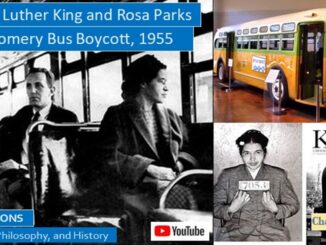
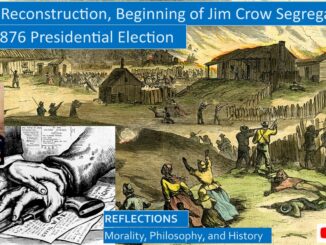
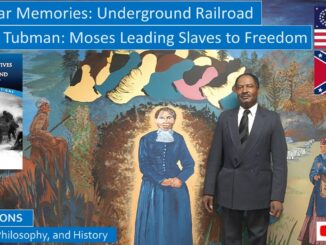
1 Trackback / Pingback